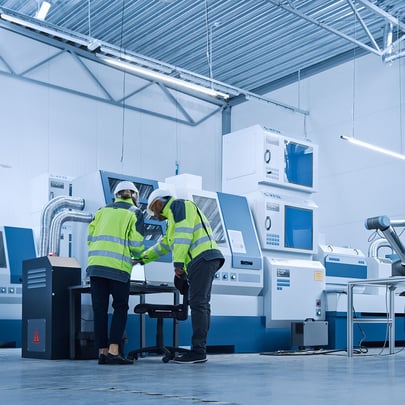Manufacturers have found increasing the use of technology in their plants to be effective and beneficial to their operations. Three operational areas that have reaped the most benefits are profitability, efficiency, and employee safety.
Manufacturing technology can be defined as techniques and processes designed to improve manufacturing quality, productivity, and practices including worker training. This includes automated processes. Some examples of this are robotics, 3D printing, cloud computing, and more.
How does technology help in manufacturing?
Profitability
 The use of new technologies in the manufacturing industry has boosted company profits exponentially. With
The use of new technologies in the manufacturing industry has boosted company profits exponentially. With
the creation of data tracking websites, such as google analytics, businesses have found measuring performance KPI’s and other conversion events to be effortless. This leads to a less complicated decision-making process when prioritizing where more time and resources should be spent.
Another problem that technology solves for manufacturers is reducing material waste from production while conserving the effectiveness of the process. This can pertain to excessive consumption of energy or raw materials, rejection at the inspection stage, and even end-product failure. Through modernization of the manufacturing process, these materials can be effectively monitored and adjusted to better reduce consumption.
Efficiency
How has technology made manufacturing more efficient? For the perfect illustration, let’s look at smart factories.

A smart factory is a concept used to describe the application of different combinations of modern technologies to create a hyperflexible, self-adapting manufacturing model. Smart factories have made designing, measuring, predicting, and controlling the manufacturing process more productive and efficient.
A prime example of a component in smart factories is a smart sensor. This useful technology has given manufacturers the opportunity to benefit from connectivity and data collection. By attaching smart sensors to machines, manufacturers can transform them into smart devices that are connected to intelligent networks along the entire supply chain.
Robotics has also made a substantial impact on manufacturer’s efficiency. Robots have provided manufacturers with superior perception, integrability, adaptability, and mobility.
These are just two examples of smart technology out of many that have made a large impact on the efficiency of manufacturing companies. With the combination of greater data and streamlined productivity, innovation continues to improve the efficiency of the manufacturing industry.
Employee Safety

Another big area where technology has helped manufacturers is employee safety. Innovation enables employers to improve workplace safety in a variety of ways, such as reducing physical stress and keeping personnel out of danger.
The list of ways technology has furthered employee safety is endless. To name a few, robots have the ability to perform difficult or impossible tasks for humans.. Drone technology advances workplace safety by removing mitigating job risk sites and enables safer ways to survey unsafe areas. Even the growth of protective wear, such as goggles, has made a big impact on manufacturers and their employees’ safety.
Conclusion
An investment into technology and innovation has consistently provided benefits in all categories for manufacturers. As businesses become more integrated with technology, the majority have seen improvements in profitability, efficiency and keeping their employees safe. With advancements in technology coming faster than ever, we’re left to wonder what new benefits manufacturers can look forward to receiving in the near future.
***********
Learn how Radwell International can help your manufacturing operation

